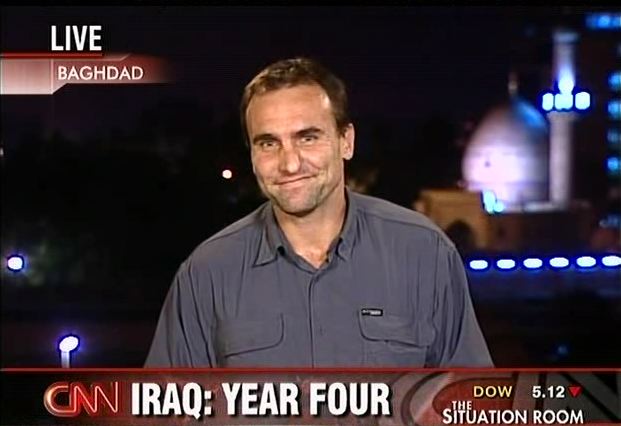TSR: Year Four in Iraq begins

Length: 6:35
LARGE (77.2 MB) ----- SMALL (7.7 MB)
WOLF BLITZER: Iraqi police say another 186 bodies have been found in the streets of Baghdad, apparent victims of sectarian violence.
After three years, has the war in Iraq become a civil war?
Let's turn now to someone who's been covering this war since it began. Joining us now live from Baghdad is Michael Ware, the Baghdad bureau chief of our sister publication, "TIME" magazine.
Michael, thanks very much for joining us.
Ayad Allawi, the former interim prime minister, says, you know what? A civil war is now under way already, no ifs, ands or buts about it.
You're there on the scene. What do you see?
MICHAEL WARE, BAGHDAD BUREAU CHIEF, "TIME" MAGAZINE": Well, I'd have to tell you, Wolf, many Iraqis would agree with him. In fact, many of them do. They tell me this daily. I mean, let's look at it.
There are dozens of bodies that are showing up on the streets and in the morgue every day. And it's been this way for over a year.
Another indicator is, let's have a look at the Al Qaeda in Iraq group of terrorist leader Abu Musab al-Zarqawi. In July last year, he felt there was enough public support amongst his constituency to publicly announce the creation of a Sunni death squad brigade.
So, many people believe that we have been in an undeclared, covert civil war for a long, long time now. And what we're seeing is it escalate.
U.S. military intelligence disagrees. They say that the violence has not yet found its own momentum, it still requires prodding from people like Zarqawi. And until that changes, this is not actually civil war.
BLITZER: Listen to what General George Casey, the U.S. military commander in Iraq, told me yesterday. Michael, listen to this.
(BEGIN VIDEO CLIP)
GEN. GEORGE CASEY, U.S. ARMY: I do not believe that civil war in Iraq, one, has started. And then, two, nor is it imminent or inevitable.
(END VIDEO CLIP)
BLITZER: Is it a matter of semantics? Because everyone agrees the sectarian violence has escalated, but there's a lot of resistance to calling this a civil war.
WARE: Well, that plays directly, Wolf, into the propaganda game that all sides have been following in this war. I mean, that's a certain symbolic term.
It's a real trigger for this to be declared a civil war. I mean, that bears heavily on the state of the U.S. mission.
I mean, the fine details of the formula to be applied to determine civil war belongs in a political science class. But it's certainly true that a lot of people are dying here in Iraq every day for sectarian reasons.
When there is enough dying for whatever reason to make a civil war, that's hard to say. But for many people here on the ground, it feels like one, particularly given that right now, as I stand here in a darkened capital, there are death squads out there roaming the streets.
BLITZER: The president and top Bush administration officials say the U.S. will step down in Iraq as Iraqi troops step up and are ready to take over. Are you seeing tangible signs that the Iraqi military and police forces are getting ready to take over in order to enable U.S. troops to withdraw?
WARE: There are signs of steps forward. In some cases, it's one step forward, two steps back.
We're seeing more and more areas of Iraq battle space being given to Iraqi army units and Iraqi police units. However, even the Iraqi commanders will tell you, we cannot hold this ground without the massive support and infrastructure of the U.S. military.
So whilst they can maintain a certain veneer of control, they really cannot do it on their own. When the time comes that they can, that's really, really hard to say right now. And there's no pulling out for U.S. forces now. In for a penny, in for a pound.
If they stay, that perpetuates the anti-American support for the insurgency. If they leave, it just leaves the door open for the terrorists and those militias backed by Iran.
BLITZER: Well, what are the consequences? Elaborate a little on a quick U.S. withdrawal.
WARE: What we would see is a descent into absolute chaos. We would see real conflict. Civil war perhaps on a grander scale with real regional implications.
You would see Iran making a play, Turkey, Syria, perhaps even Jordan and others. This would provide the chaos that allows al Qaeda to thrive. In some parts of this country that would not be under Shia or Kurdish control, we would see al Qaeda and other terrorist camps flourish.
At the same time, we would see the consolidation of Iranian influence -- a stated member of what President Bush called the axis of evil -- here in Iraq. It is definitely a failure for the U.S. mission if that situation occurs, and that is almost certainly inevitable if there was a quick and rapid withdrawal -- Wolf.
BLITZER: You've done excellent reporting on the insurgency. Is it your sense the insurgency is getting stronger, or is it getting weaker?
WARE: Look, one of the things about this insurgency, one of its most significant characteristics, is its enduring quality, its ability to regenerate. No one from military intelligence to Iraqi commanders disputes the fact that since the early stages of this insurgency, until now, they are able to put as many as 15,000 to 20,000 fighters in the field on any given day. That hasn't changed.
As quickly as insurgents are arrested or killed, they seem able to regenerate, to recruit again, or to import. That's from rank and file all the way up to top leaders.
BLITZER: Michael Ware is back in Baghdad.
Be careful over there, Michael. We'll speak early and often. Appreciate your work. Thanks very much for joining us.
